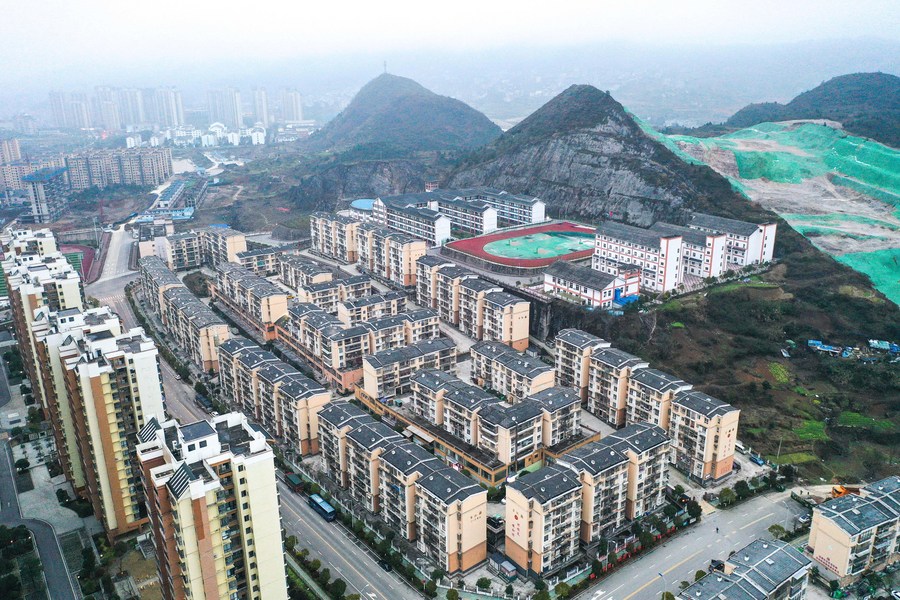BEIJING, Oct. 13 (Xinhua) -- For China, the past decade has been an epic journey. Under the leadership of the Communist Party of China, remarkable transformations, landmark projects and historic breakthroughs took place in this land of vitality and prosperity.
An extensive review of these achievements, measured from multiple perspectives, may provide some insights into how far China has advanced in its pursuit of national development and rejuvenation over the past ten years.
NEW HEIGHTS
In May 2020, when an eight-member Chinese team climbed to the summit of Mount Qomolangma to survey the mountain, they kept in touch with the base camp of the peak via 5G network.
This owes to the world's highest 5G base station, which was built at an altitude of 6,500 meters in tandem with the survey mission to provide signals covering the summit of Mount Qomolangma.
Delivering a 5G signal to the world's highest peak is not the only new height China reached in the past decade. On June 25, 2021, the world's highest electrified railway started operation in southwest China's Tibet Autonomous Region, connecting the regional capital Lhasa and Nyingchi City.
The country now also boasts the world's highest civil airport, train station and grid-connected photovoltaic power station as growing innovation and infrastructure strengths are taking the Chinese people to higher levels of development and well-being.
From 2012 to 2021, China's GDP grew from 53.9 trillion yuan (about 7.58 trillion U.S. dollars) to 114.4 trillion yuan, and its per capita GDP jumped to over 12,000 U.S. dollars from 6,300 dollars. Also in this period, the country's contribution to global economic growth exceeded 30 percent.

A Chinese surveyor conducts surveying atop Mount Qomolangma on May 27, 2020. (Xinhua/Tashi Tsering)
FASTER SPEED
Backed by technological advancement, development progress and institutional strength, China has gained speed in many areas. In 2021, China introduced a high-speed maglev train that can operate at a top speed of 600 kilometers per hour as the country continued to lead the world in rail technologies.
In December last year, a Long March-4B rocket successfully sent a new group of satellites into space, marking the 400th launch mission of the China-developed Long March carrier rocket series.
Of the 400 launch missions by Long March rockets, the first three 100 launches were completed in 37 years, seven and a half years, and around four years, respectively, while the fourth 100 missions were carried out in only 33 months.
With leapfrog development being made in telecommunication infrastructure, China has become faster digitally. The country has built the world's largest 5G network, and every administrative village now enjoys access to a broadband service.
In the battle against the COVID-19 virus, China also moved fast to brave the challenges. Makeshift hospitals were built quickly, and the shortage of medical resources and supplies was solved in the shortest time possible. By doing so, people's lives and health were protected to the maximum extent.
GREAT STRIDES
Over the past ten years, China has made great strides in different spheres from space exploration, scientific and technological innovation to infrastructure construction.
China's Tianwen-1, consisting of an orbiter, a lander and a rover, successfully landed on Mars on May 15, 2021, nearly 300 days after it was launched from the Wenchang Spacecraft Launch Site on the coast of southern China's island province of Hainan on July 23, 2020.
In September 2022, the C919, China's first homegrown large jetliner, secured certification from the Civil Aviation Administration of China, a milestone step on its journey to market operation.
The 55-km Hong Kong-Zhuhai-Macao Bridge, known as the longest bridge-and-tunnel sea crossing in the world, links China's Hong Kong Special Administrative Region (SAR), the city of Zhuhai in the southern Guangdong Province and Macao SAR. It has brought tremendous opportunities and benefits to the Guangdong-Hong Kong-Macao Greater Bay Area.

Aerial photo taken on Jan. 30, 2022 shows a relocation site for poverty alleviation in Kaili, southwest China's Guizhou Province. (Xinhua/Yang Wenbin)
PRECISE APPROACH
China's elimination of extreme poverty has been one of the highlights of the country's remarkable development over the past decade.
The country had lifted all of its 98.99 million impoverished rural residents out of poverty by the end of 2020. Precise measures were implemented to improve the efficiency of poverty alleviation work.
This approach required officials of all levels to identify who the actual impoverished people were and the factors that led to their poverty.
Nearly 20 million civil servants and volunteers were positioned in impoverished villages to battle poverty on the frontline. Each household or even family member was given a bespoke poverty relief plan.
GOING DEEPER
The Jinping Underground Laboratory, located 2,400 meters beneath the surface in southwest China's Sichuan Province, is the deepest underground laboratory in the world.
Within the depths of this lab, experiments in astrophysics and dark matter are able to be performed, which has helped China attain leadership in the world concerning research in these fields.
The construction of the lab is just an epitome of China's broader enormous strides in exploring the mysteries of space and seeking excellence in the pursuit of science.
China has been striving to strengthen scientific and technological innovation by placing it at the center of overall national development. Major achievements include the unveiling of the Fendouzhe deep-sea manned submersible, the Five-hundred-meter Aperture Spherical Radio Telescope (FAST) and the launch of a deep space monitoring network.

Photo taken on Dec. 24, 2014 shows the Jinpingshan tunnel, where the Jinping Underground Laboratory is located, in Liangshan Yi Autonomous Prefecture, southwest China's Sichuan Province. (Xinhua/Shen Bohan)
POWER OF REFORM
China's consistent and firm reform efforts were the powerful impetus behind the country's historical changes and substantial achievements in the past decade.
By fully leveraging the decisive role of the market in allocating resources, China has granted market entities more vitality and space to develop and amass wealth. Driven by these efforts, China's market entities have been growing and are playing crucial roles in fuelling the economy and stabilizing employment.
The number of market entities registered in China has topped 160 million, creating job opportunities for approximately 300 million people, official data showed.
Focusing on ensuring and improving people's well-being, the Chinese government has made institutional innovations ranging from trial projects in pursuit of effective rural residential land reform to the reform of the medical and healthcare system.
Amid efforts to boost opening up, China has also shortened the negative list for foreign investment for five consecutive years since 2017, and put more laws and regulations into force, including the Foreign Investment Law, to step up protection for foreign investors.
SOLID FOUNDATION
Under natural conditions, it takes 200 to 400 years to form a one-centimeter layer of black soil that is very precious for farming.
In the northeastern province of Heilongjiang, the average thickness of the arable layer in the black soil area has increased from 19.8 cm to 23.3 cm due to the promotion of agricultural technologies, crucial to ensure China's grain security.
Just like crops need fertile soil to grow, China achieved tremendous growth in the past decade thanks to its robust economic fundamentals.
China boasts the biggest and most complete industrial system worldwide. It is the world's largest producer of over 220 types of industrial products and has all the industrial categories listed in the United Nations industrial classification.
The country also built the world's largest 5G network, largest high-speed railway system, largest expressway network and largest online retail market.
All these efforts help create a solid foundation for the development of the real economy and China's industrial upgrading.
HIGHER DENSITY
China is seeking to increase the "density" of its economic growth -- higher-quality and more efficient economic expansion by maximizing economic and social benefits, advancing innovation, and boosting emerging sectors while minimizing the environmental impact and resource exploitation.
Compared with 2012, China's energy consumption, carbon emissions and water consumption per unit of GDP had dropped by 26.4 percent, 34.4 percent and 45 percent, respectively, in 2021.
China's land consumption per unit of GDP declined by 40.85 percent in the 2012-2021 period.
China's innovation capabilities have grown significantly, with the country moving up to 11th place in the Global Innovation Index 2022 released by the World Intellectual Property Organization, 23 places higher than its 2012 ranking.
New growth drivers such as biomedicine, new energy vehicles, and artificial intelligence constantly came to the fore, injecting new impetus into the Chinese economy.

Aerial photo taken on Sept. 27, 2022 shows a new energy vehicles parking lot at a railway freight center in Liuzhou City, south China's Guangxi Zhuang Autonomous Region. (Xinhua/Zhang Ailin)
REACHING OUT
China is leaving ever-increasing marks on global development, bringing better lives and other tangible benefits to countries and regions worldwide.
A series of landmark projects bore witness to this contribution. The Peljesac Bridge in the south of Croatia, built by a Chinese consortium, opened in July 2022. It realized "the centuries-old dream of connecting the south with the rest of Croatia," said Croatian Prime Minister Andrej Plenkovic.
Thanks to the China-proposed Belt and Road Initiative, the Maldives has its first cross-sea bridge, Serbia's Smederevo steel mill restored prosperity, and the Mombasa-Nairobi Standard Gauge Railway helped facilitate transportation along the route.
A vast market, a host of myriad global events, a manufacturing powerhouse -- China has never been more integrated into the world economy.
Currently, an average of over 73 million yuan worth of goods are traded per minute between China and the rest of the world, while over 40 trains travel back and forth between China and around 200 European cities every day.

Students have a nutritious diet at a school in Suiyang County, southwest China's Guizhou Province, Oct. 12, 2021. (Xinhua/Yang Ying)
INFUSING WARMTH
Guided by the people-centered philosophy upheld by the Chinese leaders, the country's remarkable development in the past decade has spread warmth and care among its people.
Nearly 99 million rural poor people were lifted from poverty as the country eradicated absolute poverty for good, and a moderately prosperous society in all respects has been built.
Some 350 million rural students are guaranteed a nutritious diet, while 1.04 billion people are covered by basic pensions and 1.36 billion by medical insurance.
Going forward, China has set out new development goals and placed common prosperity in a more prominent position, aiming at affluence shared by everyone, both in material and cultural terms.
"We must insist that our development is for the people and depends on the people and that its fruits are shared by the people," stated a document on the country's development for the 2021-2025 period and long-term goals through 2035.
